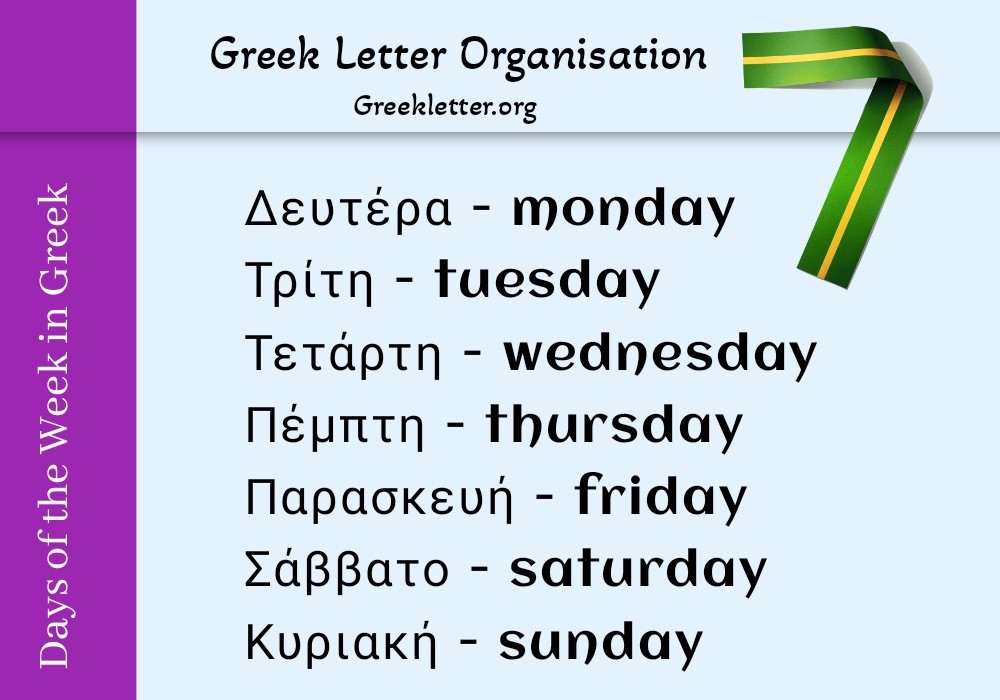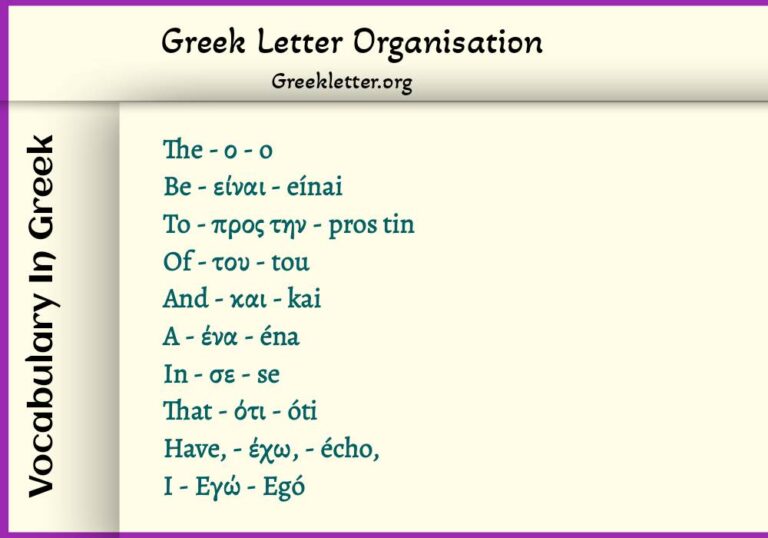Days Of The Week In Greek Pronunciation: Audio
If you want to learn how to pronounce the days of the week in Greek, Greeketter.org is the perfect resource. With our audio pronunciation guide, you can easily learn how to say each day of the week in Greek.
We also provide helpful tips on how to get started with learning the Greek language. Whether you are a beginner or an experienced learner, we can help you improve your skills and knowledge of this beautiful language.
There are seven days of the week, but they can be divided into two categories:
- Weekdays
- Weekends.
There are five weekdays: Monday, Tuesday, Wednesday, Thursday, and Friday. These are the days that most people have to work. The weekends are Saturday and Sunday. These days, people usually have off from work and can relax.
|
Table of Contents
show
Days of the Week in Greek Pronunciation( Greek Word – Phonics – Meaning)
|
Days of the Week in Greek Pronunciation
If you’re learning Greek, you’ll need to know how to pronounce the days of the week. There are slight differences between how the days are pronounced in Greece and other countries that use the Latin alphabet. Here’s a guide to help you get started.
First, you need to know that most Greek words are stressed on the last syllable. If a word has more than one syllable, the last syllable will be pronounced slightly louder than the others. For example, the word for “Wednesday” is Τρίτη (TREE-tee). The stress is on the last syllable, so it’s pronounced with an emphasis on the “tee” sound.
Another thing to remember is that some letters are pronounced differently in Greek than in English.
Spell All Seven Days of the Week in Greek
The Greek language has a rich history that spans more than 3,000 years. It is one of the oldest Indo-European languages and is still spoken by millions worldwide.
The Greek alphabet has 24 letters and is used to write both modern and ancient Greek languages.
The days of the week in Greek are spelled as follows: Monday – Κυριακή, Tuesday – Δευτέρα, Wednesday – Τρίτη, Thursday – Τετάρτη, Friday – Πέμπτη, Saturday – Σάββατο, Sunday – Κυριακή.
The Greeks have some weird words for the days of the week!
The Greeks have some weird words for the days of the week. The word for Wednesday, for instance, is “hēmera tritēs,” or “third day.” And Thursday’s word is “hēmera tessarōn,” or “fourth day.” But why are these words so different from the other days of the week?
The Greek week begins on Monday, not Sunday, like in most other cultures. This is because the Greeks named the days after their Gods.
So, Monday is named after the moon goddess Selene, Tuesday is named after the war god Ares, Wednesday is named after the messenger god Hermes, Thursday is named after Zeus, and Friday is named after Aphrodite. Saturday and Sunday are different.
Learn the Days of the Week in Greek and Important Americans
Though it may seem daunting, learning the days of the week in Greek is easy and can be a fun way to connect with the language and culture. Additionally, by understanding the origins of the days of the week, you can learn about some of the most important Americans in history.
The seven days of the week in Greek are as follows:
- Κυριακή (Sunday)
- Δευτέρα (Monday)
- Τρίτη (Tuesday)
- Τετάρτη (Wednesday)
- Πέμπτη (Thursday)
- Παρασκευή (Friday)
- Σάββατο (Saturday).
Conclusion Points
The Greek days of the week are derived from the names of the classical planets and are, therefore, related to ancient Roman religion and mythology.
The introduction of the seven-day week to Greece can be attributed to the Romans during the late empire. However, in the early Christian era, the days of the week were named after celestial bodies such as the sun, moon, and planets.
In conclusion, thanks for visiting Greekletter.org and learning about the Days of the Week in Greek Pronunciation Audio. We hope you found this article helpful, and please write in the comment box below if you have any questions or suggestions.
FAQs
1. How do you pronounce the days of the week in Greek?
The pronunciation of the days of the week in Greek can vary slightly depending on regional accents, but generally, it is Kiriakí (Sunday), Deftera (Monday), Triti (Tuesday), Tetárti (Wednesday), Pémpti (Thursday), Paraskeví (Friday), Sábbato (Saturday).
2. Are there any silent letters in the Greek names of the days?
No, there are no silent letters in the Greek names of the days.
3. Can you provide an audio recording for each day of the week?
Yes, our website has audio recordings available for each day of the week in Greek pronunciation.
4. Are there any alternative pronunciations for the days of the week in Greek?
While there may be slight variations in pronunciation due to regional accents, there are no widely recognized alternative pronunciations for the days of the week in Greek.
5. How can I pronounce the days of the week correctly?
To learn to pronounce the days of the week correctly, you can listen to our audio recordings and practice repeating them. It may also be helpful to consult a pronunciation guide or work with a language tutor.
6. What is the significance behind each day’s name in Greek?
The names of the days in Greek are derived from ancient mythology and religious traditions. For example, Kiriakí is named after Kyriake, meaning the Lord’s Day or Sunday.
7. Can I use these pronunciations when speaking with native Greek speakers?
Yes, using these pronunciations will generally be understood by native Greek speakers. However, remember that regional accents and dialects may influence pronunciation slightly.
8. Are these pronunciations also applicable only to Modern Greek or Ancient Greek?
These pronunciations are specifically applicable to Modern Greek. The pronunciation of the days of the week in Ancient Greek would have been different.






